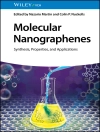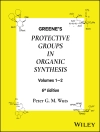The authors of this guide are experts on the use of microwaves for drug synthesis as well as having much experience in teaching courses held under the auspices of the American Chemical Society and the IUPAC.
In this handy source of information for any practicing synthetic chemist they focus on common reaction types in medicinal chemistry, including solid-phase and combinatorial methods. They consider the underlying theory, latest developments in microwave applications and include a variety of examples from recent literature, as well as less common applications that are equally relevant for organic and medicinal chemists.
An indispensable reference for researchers with an affinity to modern methods.
قائمة المحتويات
Introduction: Microwave Synthesis in Perspective
MICROWAVE THEORY
Microwave Radiation
Microwave Dielectric Heating
Microwave versus Conventional Thermal Heating
Microwave Effects
EQUIPMENT REVIEW
Domestic Microwave Ovens
Microwave Reactors for Organic Synthesis
Multimode Instruments
Single-Mode Instruments
MICROWAVE PROCESSING TECNIQUES
Solvent-free Reactions
Phase-Transfer Catalysis
Reactions Using Solvents
Parallel Processing
Scale-Up in Batch and Continuous Flow
GETTING STARTED WITH MICROWAVE CHEMISTRY
Why Use Microwave Reactors?
Translating Convenionally Heated Methods
Reaction Optimization and Library Generation
Limitations and Safety Aspects
LITERATURE SURVEY: GENERAL ORGANIC SYNTHESIS
Transition Metal-catalyzed Carbon-Carbon Bond Formation
Transition Metal-catalyzed Carbon-Heteroatom Bond Formation
Other Transition Metal-mediated Processes
Heterocycle Synthesis
LITERATURE SURVEY: COMBINATORIAL AND HIGH-THROUGHPUT SYNTHESIS
Solid-Phase Organic Synthesis
Soluble Polymer-supported Synthesis
Task-specific Ionic Liquids
Fluorous Synthesis
Polymer-supported Reagents, Catalysts and Scavengers
عن المؤلف
C. Oliver Kappe was born in Graz (Austria) and received his doctoral degree from the Karl-Franzens-University in Graz in 1992, working with Gert Kollenz on acylketenes. After postdoctoral research work with Curt Wentrup at the University of Queensland, Brisbane (Australia), and with Albert Padwa at Emory University, Atlanta (USA), he moved back to the University of Graz where he currently holds a position as associate Professor. In 2003 he spent a sabbatical at the Scripps Research Institute in La Jolla (USA) with K. Barry Sharpless. His research focuses on microwave-enhanced synthesis, combinatorial chemistry, multicomponent reactions, and biologically active heterocycles.
Alexander Stadler was born in Bruck and der Mur (Austria) and studied Chemistry at the University of Graz. He then obtained his doctoral degree for studies on microwave-accelerated reactions in solution and on solid phase in the group of C. Oliver Kappe. After postdoctoral research work on microwave-assisted transition metal-catalyzed coupling reactions in the group of Mats Larhed at the University of Uppsala (Sweden) he joined Anton Paar Gmb H in Graz in 2004 as product specialist for microwave synthesis.












